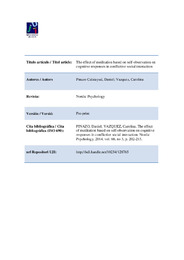Por favor, use este identificador para citar o enlazar este ítem:
https://hdl.handle.net/11000/34850Registro completo de metadatos
| Campo DC | Valor | Lengua/Idioma |
|---|---|---|
| dc.contributor.author | Pinazo, Daniel | - |
| dc.contributor.author | Vázquez, Carolina | - |
| dc.contributor.other | Departamentos de la UMH::Ciencias del Comportamiento y salud | es_ES |
| dc.date.accessioned | 2025-01-17T10:17:42Z | - |
| dc.date.available | 2025-01-17T10:17:42Z | - |
| dc.date.created | 2014 | - |
| dc.identifier.citation | Nordic Psychology, 2014, vol. 66, no 3, p. 202-215. | es_ES |
| dc.identifier.issn | 1901-2276 | - |
| dc.identifier.issn | 1904-0016 | - |
| dc.identifier.uri | https://hdl.handle.net/11000/34850 | - |
| dc.description.abstract | Conflictive social interactions are associated with the attribution of responsibility for our negative experiences to the other, and with a distant social perception of the other. When we meditate we acquire skills related to thought that allow us to observe how we perceive and signify interaction with the other, which distances us from the response to the meaning of this perception. This way of attending to events can have a negative effect on the tendency to make dispositional attributions, which are generally more conflictive, since the person making the attribution blames the other for the unpleasant situation he or she is experiencing. For this reason, the associated practice of meditation may affect social interactions by reducing conflict. The relationship between infrequent meditation, associated to the development of self-observation, with the locus of attribution for an unpleasant event, the perception of anger with oneself, and the social distance from the outgroup was analysed using a sample of 229 individuals (118 non-meditators and 111 unspecific meditators). Results show that meditation has the effect of reducing dispositional attributions, perception of anger and social distance, and provide evidence for the moderating effect of self-observation ability. | es_ES |
| dc.format | application/pdf | es_ES |
| dc.format.extent | 26 | es_ES |
| dc.language.iso | eng | es_ES |
| dc.publisher | Taylor & Francis | es_ES |
| dc.rights | info:eu-repo/semantics/openAccess | es_ES |
| dc.rights | Attribution-NonCommercial-NoDerivatives 4.0 Internacional | * |
| dc.rights.uri | http://creativecommons.org/licenses/by-nc-nd/4.0/ | * |
| dc.subject | meditation | es_ES |
| dc.subject | self-observation | es_ES |
| dc.subject | attribution | es_ES |
| dc.subject | social interaction and conflict | es_ES |
| dc.subject.other | CDU::6 - Ciencias aplicadas::60 - Cuestiones generales de las ciencias aplicadas | es_ES |
| dc.title | The effect of meditation based on self-observation on cognitive responses in conflictive social interaction | es_ES |
| dc.type | info:eu-repo/semantics/article | es_ES |
| dc.relation.publisherversion | http://dx.doi.org/10.1080/19012276.2014.935460 | es_ES |

Ver/Abrir:
Artículo Castellón 2014 nordic psychology pinazo vazquez (1).pdf
342,26 kB
Adobe PDF
Compartir:
 La licencia se describe como: Atribución-NonComercial-NoDerivada 4.0 Internacional.
La licencia se describe como: Atribución-NonComercial-NoDerivada 4.0 Internacional.
.png)